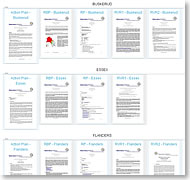Briefing Paper 06
| Attachment | Size |
|---|---|
| 06- PURE_Briefing_Paper_-_Consultative_Development_Groups.pdf | 41.58 KB |
Embedded Scribd iPaper - Requires Javascript and Flash Player
Observatory PASCAL
Place Management, Social Capital and Learning Regions PASCAL UNIVERSITIES REGIONAL ENGAGEMENT PROJECT (PURE) PURE Briefing Paper No. 6 Consultative Development Groups (CDGs) and First Round Visits
A. The purpose of BP 6 Contracts are now being completed for the first cohort of PURE regions to start work at the beginning of 2009. CDGs are being identified and prepared for this work, to be agreed with each region with a view to involvement in the project from an early stage. (Contracts are being managed in the Glasgow PURE office, CDGs by Chris Duke). This Briefing Paper is intended to brief regions and CDG members on the task and processes involved. Comments are invited. BP6 can be revised if necessary, to be as clear and helpful as possible. BP6 is being sent to prospective CDG members and to Regional Coordinators (RCs). Please let Chris Duke have any questions and comments as soon as you can ([email protected]). RCs should if possible consult colleagues who will be centrally involved, for opinions and advice. B. Action required by Regional Coordinators B.1 Immediately: Establish the membership of a regional working or steering group, and how it will work for the life of the project. If possible, consult these colleagues and suggest to Chris Duke ([email protected]) any changes and additions required to this Briefing Paper by 11th December 2008. B.2 In the period December 2008 - February 2009: [Material under these headings should supplement the region profile ‘snapshot’ data which can be read in association with it. There is no need to duplicate any material.] 1. Clarify what is meant by the region in this project e.g. historical/cultural, long-term administrative and legal, or specially created for a particular development purpose. 2. Set out briefly key characteristics in terms of geography, economy, demography, social structure, trends and changes, as these affect PURE and the development agenda. 3. Identify and draw together a reference list of the main data sources available on the socioeconomic, environmental etc condition of the region, and recent trends. 4. Summarise existing efforts to monitor and benchmark progress against purposes and targets. 5. Identify and list the main existing forms of collaboration between HEIs and the region (as an administrative entity, and in terms of other stakeholders, public, private, and NGO or third sector). 6. Identify and list the main problems and challenges, and the main development aspirations, shared by stakeholders in the region (please consider the full spectrum of civil, economic, social, cultural, and environmental factors, including issues of sustainability).
PURE BP No. 6 http://www.obs-pascal.com/ Page |1
Observatory PASCAL
Place Management, Social Capital and Learning Regions 7. Identify and list the main changes looked for by taking part in PURE: 7.1 For the region as a whole, and/or for particular communities and interests within it; 7.2 Within and on the part of higher education institutions; 7.3 In terms of how regional and local government are managed; and 7.4 In terms of the role and policies of central government. [Please keep in mind in points 7.1 - 7.4 the full spectrum of issues, of course including but not confined to the economic] 8. Please list your key issues for discussion with the CDG when it visits your region. B.3 Meeting logistics: Please propose a schedule of meetings and visits for the CDG visit, liaising with the PURE Glasgow office to arrange these. Please prepare a brief report for the CDG and then for the PURE website and wider sharing, that addresses the 8 points above, using these as your headings. C Rationale - The PURE Approach C.1 Other review methodologies require regions to undertake a detailed status self-review, using a common general template, before there is any outside involvement from a review group. PURE differs in several ways. It seeks to be tailored to the unique circumstances of change in each region. Rather than offering just evaluative and judgmental reviews, PURE seeks to bring to each region a consultative and developmental approach (hence the term CDG). There is an explicit focus from the outset on changing and improving the quality of partnership, and on beneficial outcomes in terms of regional development which will also benefit the higher education (HE) sector. C.2 Direct exchange with other regions sharing similar ambitions and challenges will assist practical learning, and the adoption of good practice. CDGs will reinforce the PURE networking approach, drawing members where possible from other participating regions, and ‘twinning’ regions so that ‘reciprocal reviewers’ between regions share common interests. This is what we mean by ‘peer reviewing’. C.3 The exact composition of each CDG will also depend on the special interests and needs of the region. Of course practical convenience, dates for visits and availability of those involved must also be taken into account. C.4 To get the full benefit of developmental self-analysis and review, CDGs will be identified and involved at the outset. The first visits will take place early in 2009 – if possible before Easter, and ideally by the end of March. This will allow time for comparative analysis, and a report to the next full PURE gathering in mid-May. C.5 CDGs will thus be working with each region, alongside the region’s own working group drawn from the different stakeholders, once basic data are collected and analysed. The agenda for development will be refined together, once the region working group has first pointed to its priority issues through the PURE process.
PURE BP No. 6 http://www.obs-pascal.com/ Page |2
Observatory PASCAL
Place Management, Social Capital and Learning Regions C.6 Each CDG will connect the region to the whole PURE project (and in due course to the next cohort of regions coming on stream). It will also directly strengthen links with other regions sharing similar priorities. It will include valuable expertise relevant to those priorities. As part of this process, by May 2009, it is intended that regions will join one or more clusters or sub-groups of regions around special concerns of particular interest and importance to them.
C.7 The central purpose of PURE is to improve what happens in the region, and to work for the continuation and sustainability of good practices. It is action-oriented. At the same time, it is essential to know the situation, and to be able to use existing and new data effectively to inform good practice. Regions therefore need to assemble what is already known, and to have a basis for monitoring changes, and evaluating what works. The PURE project requires regions first to prepare snapshot profiles to inform other regions, and then to identify and make available statistical and qualitative data relevant to regional development, and the work and management of HE institutions. C.8 It is essential to be able to learn from past and present experience, and to be able to make best use of data available from all sources to inform regional governance and the management of productive partnership. This explains the need for the data-gathering in points 1-6 above, and the agenda-setting in points 7-8. It is also important to be able assess progress, and to continue to learn and improve from understanding what is working and what is not. We also need to be able account for the effort and resources used when higher education institutions engage with the development of their regions. C.9 For these reasons the PURE project will also make available tools to assist monitoring and benchmarking both by the regions and by HEIs. These are being prepared at present, along the lines agreed at the Glasgow PURE working meeting in September 2008. They will be made available prior to CDG visits, to assist the consultative and planning purpose and for ongoing use and if necessary adaptation. Separately from this, Pascal is preparing a longer briefing paper, in the form of a Hot Topic, on different approaches to indicators and benchmarking available to use for different purposes in this field.
Chris Duke 25th November 2008
PURE BP No. 6
http://www.obs-pascal.com/
Page |3
Observatory PASCAL
Place Management, Social Capital and Learning Regions PASCAL UNIVERSITIES REGIONAL ENGAGEMENT PROJECT (PURE) PURE Briefing Paper No. 6 Consultative Development Groups (CDGs) and First Round Visits
A. The purpose of BP 6 Contracts are now being completed for the first cohort of PURE regions to start work at the beginning of 2009. CDGs are being identified and prepared for this work, to be agreed with each region with a view to involvement in the project from an early stage. (Contracts are being managed in the Glasgow PURE office, CDGs by Chris Duke). This Briefing Paper is intended to brief regions and CDG members on the task and processes involved. Comments are invited. BP6 can be revised if necessary, to be as clear and helpful as possible. BP6 is being sent to prospective CDG members and to Regional Coordinators (RCs). Please let Chris Duke have any questions and comments as soon as you can ([email protected]). RCs should if possible consult colleagues who will be centrally involved, for opinions and advice. B. Action required by Regional Coordinators B.1 Immediately: Establish the membership of a regional working or steering group, and how it will work for the life of the project. If possible, consult these colleagues and suggest to Chris Duke ([email protected]) any changes and additions required to this Briefing Paper by 11th December 2008. B.2 In the period December 2008 - February 2009: [Material under these headings should supplement the region profile ‘snapshot’ data which can be read in association with it. There is no need to duplicate any material.] 1. Clarify what is meant by the region in this project e.g. historical/cultural, long-term administrative and legal, or specially created for a particular development purpose. 2. Set out briefly key characteristics in terms of geography, economy, demography, social structure, trends and changes, as these affect PURE and the development agenda. 3. Identify and draw together a reference list of the main data sources available on the socioeconomic, environmental etc condition of the region, and recent trends. 4. Summarise existing efforts to monitor and benchmark progress against purposes and targets. 5. Identify and list the main existing forms of collaboration between HEIs and the region (as an administrative entity, and in terms of other stakeholders, public, private, and NGO or third sector). 6. Identify and list the main problems and challenges, and the main development aspirations, shared by stakeholders in the region (please consider the full spectrum of civil, economic, social, cultural, and environmental factors, including issues of sustainability).
PURE BP No. 6 http://www.obs-pascal.com/ Page |1
Observatory PASCAL
Place Management, Social Capital and Learning Regions 7. Identify and list the main changes looked for by taking part in PURE: 7.1 For the region as a whole, and/or for particular communities and interests within it; 7.2 Within and on the part of higher education institutions; 7.3 In terms of how regional and local government are managed; and 7.4 In terms of the role and policies of central government. [Please keep in mind in points 7.1 - 7.4 the full spectrum of issues, of course including but not confined to the economic] 8. Please list your key issues for discussion with the CDG when it visits your region. B.3 Meeting logistics: Please propose a schedule of meetings and visits for the CDG visit, liaising with the PURE Glasgow office to arrange these. Please prepare a brief report for the CDG and then for the PURE website and wider sharing, that addresses the 8 points above, using these as your headings. C Rationale - The PURE Approach C.1 Other review methodologies require regions to undertake a detailed status self-review, using a common general template, before there is any outside involvement from a review group. PURE differs in several ways. It seeks to be tailored to the unique circumstances of change in each region. Rather than offering just evaluative and judgmental reviews, PURE seeks to bring to each region a consultative and developmental approach (hence the term CDG). There is an explicit focus from the outset on changing and improving the quality of partnership, and on beneficial outcomes in terms of regional development which will also benefit the higher education (HE) sector. C.2 Direct exchange with other regions sharing similar ambitions and challenges will assist practical learning, and the adoption of good practice. CDGs will reinforce the PURE networking approach, drawing members where possible from other participating regions, and ‘twinning’ regions so that ‘reciprocal reviewers’ between regions share common interests. This is what we mean by ‘peer reviewing’. C.3 The exact composition of each CDG will also depend on the special interests and needs of the region. Of course practical convenience, dates for visits and availability of those involved must also be taken into account. C.4 To get the full benefit of developmental self-analysis and review, CDGs will be identified and involved at the outset. The first visits will take place early in 2009 – if possible before Easter, and ideally by the end of March. This will allow time for comparative analysis, and a report to the next full PURE gathering in mid-May. C.5 CDGs will thus be working with each region, alongside the region’s own working group drawn from the different stakeholders, once basic data are collected and analysed. The agenda for development will be refined together, once the region working group has first pointed to its priority issues through the PURE process.
PURE BP No. 6 http://www.obs-pascal.com/ Page |2
Observatory PASCAL
Place Management, Social Capital and Learning Regions C.6 Each CDG will connect the region to the whole PURE project (and in due course to the next cohort of regions coming on stream). It will also directly strengthen links with other regions sharing similar priorities. It will include valuable expertise relevant to those priorities. As part of this process, by May 2009, it is intended that regions will join one or more clusters or sub-groups of regions around special concerns of particular interest and importance to them.
C.7 The central purpose of PURE is to improve what happens in the region, and to work for the continuation and sustainability of good practices. It is action-oriented. At the same time, it is essential to know the situation, and to be able to use existing and new data effectively to inform good practice. Regions therefore need to assemble what is already known, and to have a basis for monitoring changes, and evaluating what works. The PURE project requires regions first to prepare snapshot profiles to inform other regions, and then to identify and make available statistical and qualitative data relevant to regional development, and the work and management of HE institutions. C.8 It is essential to be able to learn from past and present experience, and to be able to make best use of data available from all sources to inform regional governance and the management of productive partnership. This explains the need for the data-gathering in points 1-6 above, and the agenda-setting in points 7-8. It is also important to be able assess progress, and to continue to learn and improve from understanding what is working and what is not. We also need to be able account for the effort and resources used when higher education institutions engage with the development of their regions. C.9 For these reasons the PURE project will also make available tools to assist monitoring and benchmarking both by the regions and by HEIs. These are being prepared at present, along the lines agreed at the Glasgow PURE working meeting in September 2008. They will be made available prior to CDG visits, to assist the consultative and planning purpose and for ongoing use and if necessary adaptation. Separately from this, Pascal is preparing a longer briefing paper, in the form of a Hot Topic, on different approaches to indicators and benchmarking available to use for different purposes in this field.
Chris Duke 25th November 2008
PURE BP No. 6
http://www.obs-pascal.com/
Page |3








